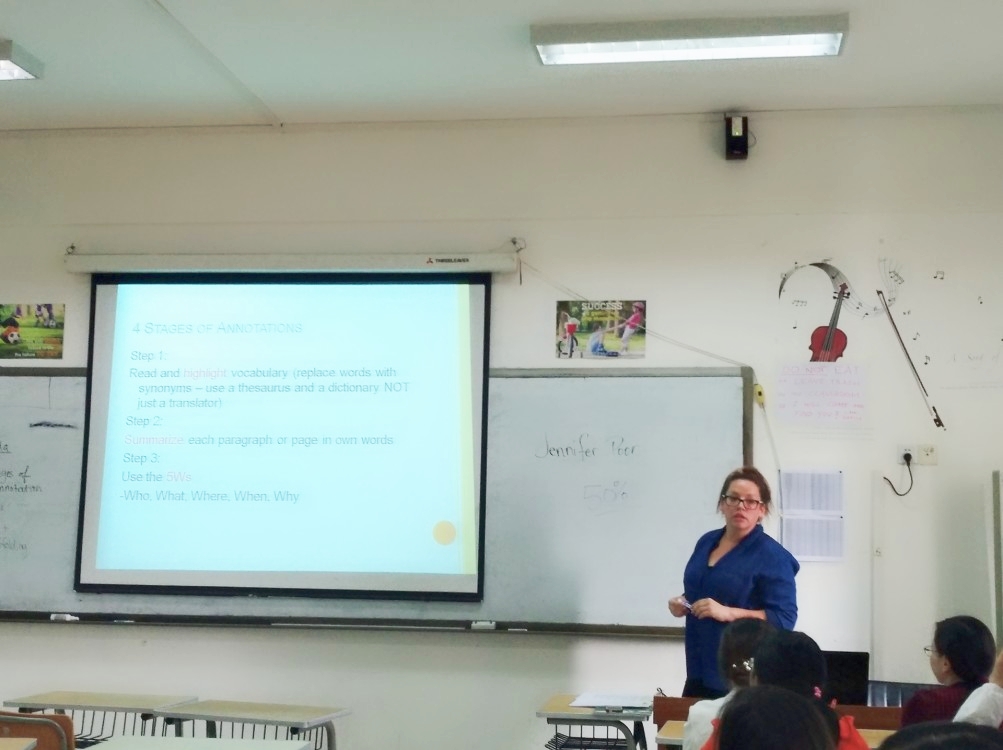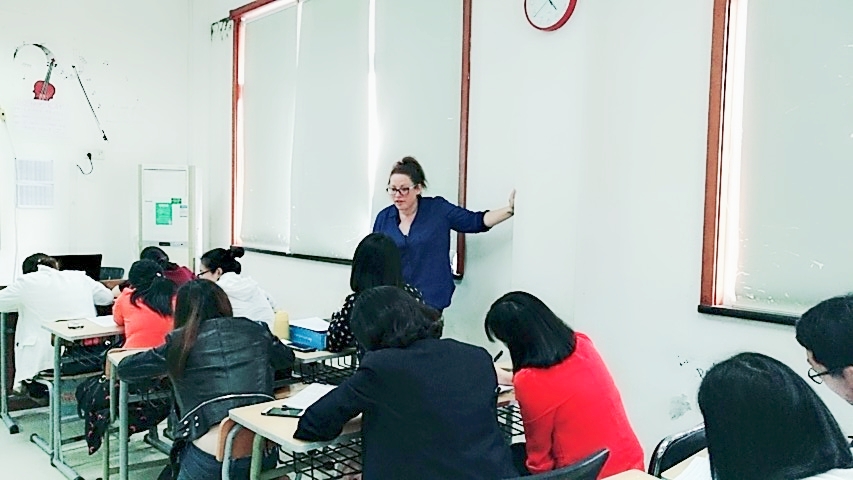怎样提高英语阅读能力?我们不一样! ----BC课程与ESL课程的教学研讨
发布时间:2018-04-16 01:00:02 责任编辑:管理员 点击次数:5019
怎样提高英语阅读能力?我们不一样!
----BC课程与ESL课程的教学研讨
一直秉承着“中加一体化”教学原则的枫叶校园里,浓郁的学术氛围不仅仅体现在学生的课堂上。每月数次的中加教学研讨会对于来自枫叶大英语工程的英语教师来说也是非常好的学习机会。在这样开放又严谨、求真且务实的分享会上,中外教师都会就如何针对性提高学生英文思维及英语能力展开热烈的探讨,并充分利用这样难得的机会互相借鉴学习。
In Maple Leaf Educational Park, which has always been sticking to the teaching principle of "education integration of Chinese and BC programs", you can see the strong academic atmosphere not only in classrooms, but also in workshops. The Chinese and BC teaching seminar is a good opportunity for ESL teachers' professional development. In such open, rigorous, realistic and pragmatic sharing seminars, both Chinese bilingual and international teachers discuss how to improve students' English thinking and English ability, and make full use of such a rare opportunity to learn from each other.

在4月11日的大英语工程研讨会上,BC课程10年级学术英语首席教师Ms. Jennifer Poor讲解了她教授学生如何精读文本,抛弃生硬的中英翻译,以英语思维理解文章的方法,让在场的老师受益匪浅。
At the GEP workshop on April 11, Ms. Jennifer Poor explained how she has been teaching her students to practice intensive reading, discard incondite English-Chinese translation, and understand the texts in English thinking. All the teachers present have benefited greatly from it.

Jennifer老师指出,用中文对英文进行翻译时最多只有50%的意思能够表达准确,尤其在考试中,照抄文章句子则体现学生并没有完全理解和无法释义文章。而在国际学校,让学生养成英文思维习惯,不再依赖中英字典而学会用英文来解释英文是十分重要的技能。她将对英语阅读进行注解的方法分为四步:首先阅读文章并标出生难单词,用英文词典找出生难单词的英文解释以及同义词,学会用简单的单词来解释复杂的单词;第二步是概括总结每一段的段落大意;第三步写出文中的5“W”(who, what, where, when, why)以考查学生的概括和写作能力;最后一步是基于对文章的理解提出自己的问题。
Ms. Poor pointed out that only 50% of English vocabulary can be translated into Chinese properly. In an international school, it is very important for students to develop their habits of thinking in English instead of relying on Chinese-English translation dictionaries, especially in the examinations.
She divides the process of annotating English reading into four stages --- Stage1: read and highlight vocabularies, just replace the words with synonyms, and ask students to use a thesaurus instead of a dictionary; Stage2: summarize each paragraph or page in own words; Stage 3: use the 5"W" (who, what, where, when, why) in order to examine students' generalization and writing abilities; Stage 4: based on the understanding of the article to raise a question.

Jennifer老师也提供给了在场老师实践练习的机会,通过一篇童话故事的学习,展示了如何根据以上四个步骤带领学生真正理解阅读。而学生是否拥有这样的再创作能力也是BC学术英语学习中非常看重的一点。往往一篇阅读,老师们会花一周时间去让学生彻底消化,帮助学生培养良好的阅读习惯。有这样认真负责的老师和国际化的教学思维,孩子们在枫叶的课堂必定能更快更好地提升自己的英语能力!
Jennifer also offered the opportunity for the teachers present to practice. Through a fairy tale story, she showed how to lead students to truly understand reading in the light of these four stages. Whether or not students have the ability to re-create is also a very important point in learning BC academic English. BC teachers would often spend a whole week getting their students to digest the reading thoroughly and help them develop good reading habits. With such responsible teachers and international teaching strategy, students in Maple Leaf can certainly improve their English ability in a faster and better way!
坚持中加一体化,不仅体现在枫叶的教学理念上,更体现在日常教学的每一分钟。通过中加集体教研活动,全体ESL教师不仅能够学习到BC学术英语的教学理念与教学方法,而且能够更好地了解BC学术英语对学生的英语水平要求,从而更好地调整ESL教学目标与教学策略。从小学、初中阶段开始,学生就在潜移默化中接受到与BC学术英语接轨的课堂活动模式与教学安排,从多层次、多角度的浸入式英语学习,打下坚实的基础,掌握必备的全英文演讲和阅读写作、小组协作、海报设计和解说等技能。正是得益于这些学术教研活动,小学、初中、高中的教学衔接越来越紧密。孩子越早进入枫叶学习,越能更好地形成英语思维模式,从而在未来的全加方课程学习中如鱼得水,收获美好未来。
Adhering to “education integration of Chinese and BC programs” is not only in Maple Leaf’s teaching philosophy, but also in the daily teaching of every class. Through these teaching and research workshops, all ESL teachers can not only learn the teaching ideas and teaching methods of BC academic English, but also understand the English proficiency requirement of BC academic English, so as to better adjust ESL teaching goals and teaching strategies. Starting from elementary and middle schools, students are subconsciously receiving the teaching activity patterns and arrangements that are in line with BC academic English. Meanwhile, they can receive the English immersion learning from various levels and dimensions, thus laying a solid foundation and mastering the necessary capabilities including speech in full-English, reading skills, group collaboration, poster design and presentation. It is these academic teaching and research activities that join an increasingly tie among the daily teaching in elementary school, middle school, and high school. The earlier a child enters Maple Leaf, the better he or she can form the English thinking mode, so that the child can smoothly adapt to BC Program, and yield a sweet fruit in the future.




 小学咨询群 480672539
小学咨询群 480672539